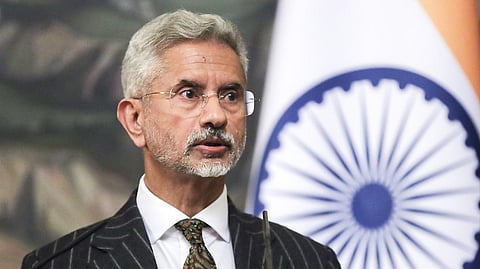

NEW DELHI: The impact of US President Donald Trump's reciprocal tariffs is still unclear, but New Delhi’s strategy is to secure a bilateral trade agreement with Washington by the fall of this year, External Affairs Minister S. Jaishankar said on Wednesday.
Jaishankar who spoke with his counterpart Marco Rubio on Monday on the early conclusion of the Bilateral Trade Agreement stressed that India is likely the only country to have reached an understanding with Washington to negotiate a trade pact after Trump assumed the presidency for a second term.
Jaishankar’s comments came just hours after Trump’s sweeping reciprocal tariffs, kicked in causing significant trade disruptions and raising concerns about a global economic downturn.
India has taken a cautious approach, engaging with the Trump administration on a bilateral trade agreement (BTA).
“I don't think it's possible to speak about what would be the impact, because we don't know. What is our strategy? I think that's pretty clear," Jaishankar said.
“We decided that we will engage the Trump administration early on this set of issues and we were very open with them, very constructive with them as they were with us, and what we agreed to do was to try to negotiate a bilateral trade agreement by fall of this year," he said.
Following talks between Prime Minister Narendra Modi and Trump in Washington DC in February, the two sides announced to negotiate the first tranche of the BTA by the fall of 2025 that would cover tariffs, non-tariff barriers and market access.
“I think we are the only country after President Trump has assumed presidency the second time, which has actually reached such an understanding in principle,” Jaishankar said.
He said every country in the world today is fashioning its own strategy to deal with the United States and that India's goal is to strike a trade pact with the Trump administration.
“In our case, our strategy has a goal. And the goal is to see whether it's possible to actually deal with this situation by concluding a bilateral trade agreement. And I should add that in an interesting way, this has long been our objective," he said.
Jaishankar also said that the “present situation” may have created the right conditions for serious trade negotiations. Reflecting on past efforts, he pointed out that a trade deal was pursued during Trump’s first term but did not materialise, and even under President Joe Biden’s administration, trade discussions led to the launch of the Indo-Pacific Economic Framework for Prosperity (IPEF) in May 2022.
“The Biden administration was very averse to a bilateral agreement, but for India, working out something bilaterally with the US is not negative. It’s actually something we've long aimed for,” he said.